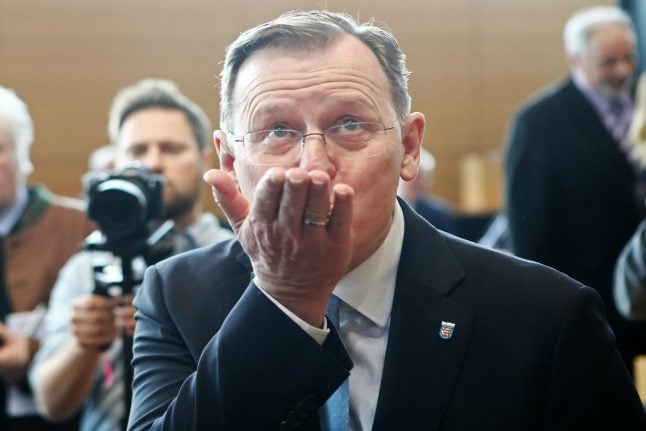Popular former state premier Bodo Ramelow, of the radical-left Die Linke party, was returned to power, despite falling four votes short of an absolute majority after the centre-right CDU abstained.
It was the second attempt in a month to form a working government in the former East German state, after CDU MPs there set off an earthquake in national politics by voting with the far-right AfD in the first vote on February 5th.
The unprecedented alliance with the far-right triggered the departure of Merkel's designated successor Annegret Kramp-Karrenbauer, and sparked a new leadership contest for the German chancellor's party.
Amid the national outrage, elected liberal candidate Thomas Kemmerich immediately stepped down, leaving the state rudderless.
As Wednesday's rerun of the vote pitted the far-left Ramelow against far-right firebrand Björn Höcke, the only viable option left for the CDU was to abstain in order to hold to its national edict of not cooperating with either extreme.
“We are returning to stable conditions,” said Ramelow , adding that Thuringia had “overcome a crisis of democratic legitimation”.
He refused to shake Höcke's hand after the vote, accusing him and his party of being “arsonists” who were “stamping on democracy”.
 Bodo Ramelow refuses to shake Björn Höcke's hand. Photo: DPA
Bodo Ramelow refuses to shake Björn Höcke's hand. Photo: DPA
READ ALSO: Thuringia set to elect new state leader after far-right vote debacle
New force on the right
A fundamental article of faith for the CDU during its decades of dominance over German politics since 1949 was that no political force could be allowed to emerge to its right.
But Merkel has shifted the party closer to the centre.
The repeated rescue programmes for Greece during the eurozone crisis and above all Merkel's decision to allow in more than one million migrants and refugees since 2015 stoked the rise of the AfD.
Double-digit scores for AfD in state elections in the East in recent years have made it increasingly tough to build working coalitions that shut out both extremes.
With the party leadership – and likely the candidacy for the chancellorship in 2021 – now up for grabs, those tensions are boiling up to the surface.
The race to a new CDU leadership election on April 25 is a fresh struggle for control between supporters of the chancellor's centrist course and those who believe the party must tack right.
Crucible
With no majority possible in Thuringia without either AfD or Die Linke, the state became a unique crucible for the CDU's repeated declarations that it would work with neither.
In Wednesday's re-run, Ramelow had initially hoped to persuade individual CDU MPs to edge him to the absolute majority needed in the first two rounds, threatening to otherwise call fresh elections.
Yet he changed strategy on Wednesday morning as conservatives railed against a potential cooperation with the far-left.
“CDU votes for a Linke party candidate are unacceptable,” moderate party leadership contender Armin Laschet said Sunday, echoing conservative rivals like long-time Merkel rival Friedrich Merz.
Yet after the CDU's abstention on Wednesday, Hoecke accused them of “holding open the door” for Ramelow, and claimed that the former East German Communist Party SED had “risen again”.
One of the most radical voices within AfD, the former history teacher's rhetoric includes calls for “tempered inhumanity” in removing non-ethnic Germans from the country.
Such statements placed him beyond the pale even for the more hardline eastern CDU branches.
On Wednesday, parliamentary president Birgit Keller opened the sitting with a tribute to the victims of a deadly racist attack in neighbouring state Hesse two weeks ago.
Ramelow is now expected to lead a minority government until new elections in April 2021, in a compromise agreed with the CDU at the height of the crisis two weeks ago.




 Please whitelist us to continue reading.
Please whitelist us to continue reading.
Member comments